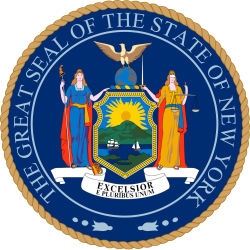| John R. Lewis Voting Rights Act of New York | |
|---|---|
 | |
| New York State Legislature | |
| Acronym | NYVRA |
| Assembly voted | June 2, 2022 (106-43) |
| Senate voted | May 31, 2022 (43-20) |
| Signed into law | June 20, 2022 |
| Governor | Kathy Hochul |
| Section | N.Y. Elec. Law § 17-200–222 |
| Bill | S.1046-E / A.6678-E |
Status: Current legislation | |
The John R. Lewis Voting Rights Act of New York (NYVRA) is a State Voting Rights Act (SVRA) modeled after the federal Voting Rights Act that is designed to prevent racial voter suppression and discrimination. It is named after the civil rights movement activist and congressman John Lewis. [1] The act prohibits voter suppression, including vote dilution, voter intimidation, voter deception, and voter obstruction. It also establishes preclearance requirements for certain jurisdictions as well as expanded requirements for jurisdictions with a certain number of adult citizens with limited English proficiency. [2]